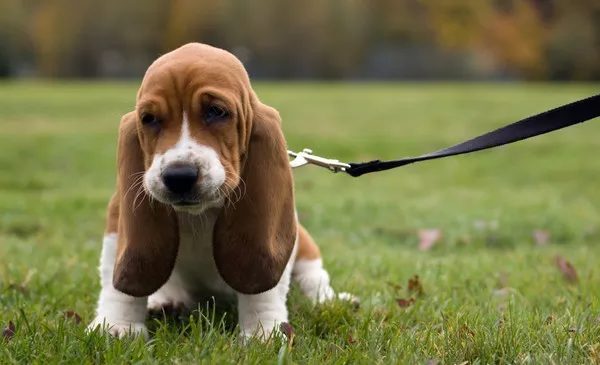Basset Hounds are a distinctive breed known for their long ears, droopy eyes, and short legs. As a veterinarian, understanding the unique nutritional needs of these puppies is crucial for their development and overall health. Proper nutrition during the early stages of life sets the foundation for a healthy and happy adult dog. This article provides an in-depth look at what constitutes good puppy food for Basset Hounds, covering essential nutrients, dietary considerations, and specific recommendations.
Nutritional Needs of Basset Hound Puppies
1. Essential Nutrients
Protein
Protein is vital for the growth and development of Basset Hound puppies. It supports muscle growth, tissue repair, and overall health. Look for puppy foods with high-quality animal-based proteins like chicken, beef, lamb, or fish.
Fats
Fats provide a concentrated source of energy and are essential for brain development and a healthy coat. Omega-3 and Omega-6 fatty acids are particularly important. Ingredients like fish oil and flaxseed are good sources.
Carbohydrates
Carbohydrates provide energy and fiber. Whole grains, vegetables, and fruits are excellent sources of carbohydrates. Ensure the food includes complex carbohydrates rather than simple sugars.
Vitamins and Minerals
Vitamins and minerals are crucial for a puppy’s growth and immune system. Key vitamins include A, D, E, and B-complex vitamins. Essential minerals include calcium, phosphorus, zinc, and iron. These should be balanced correctly in a puppy’s diet.
Water
Hydration is essential. Ensure your Basset Hound puppy always has access to fresh, clean water. Wet puppy food can also contribute to hydration.
2. Growth Considerations
Bone Development
Basset Hounds have a unique skeletal structure that requires special attention to calcium and phosphorus ratios. Excessive or inadequate amounts can lead to bone deformities or growth issues.
Weight Management
Basset Hounds are prone to obesity. Puppy food should support healthy growth without promoting excessive weight gain. Monitor portion sizes and adjust as needed based on your puppy’s activity level and growth.
Key Ingredients in Puppy Food
1. High-Quality Proteins
Ensure the puppy food lists a high-quality protein source as the first ingredient. Animal-based proteins are more digestible and beneficial than plant-based proteins.
2. Healthy Fats
Look for named fat sources such as chicken fat, fish oil, or flaxseed oil. Avoid foods with generic fat sources like “animal fat.”
3. Whole Grains and Carbohydrates
Whole grains like brown rice, barley, and oats are preferable. They provide sustained energy and fiber. Vegetables and fruits like sweet potatoes, peas, and carrots are also excellent carbohydrate sources.
4. Natural Preservatives
Natural preservatives such as mixed tocopherols (vitamin E) and rosemary extract are better than artificial preservatives like BHA, BHT, and ethoxyquin.
5. Probiotics and Prebiotics
Probiotics and prebiotics support digestive health and strengthen the immune system. Look for ingredients like dried chicory root, inulin, and specific strains of probiotics like Lactobacillus.
Common Dietary Considerations
1. Allergies and Sensitivities
Basset Hounds can develop food allergies or sensitivities. Common allergens include beef, dairy, wheat, and soy. If you notice signs of allergies such as itching, gastrointestinal upset, or ear infections, consider a limited ingredient diet.
2. Grain-Free Diets
While some owners prefer grain-free diets, it’s important to note that whole grains can be beneficial. Grain-free diets should still provide adequate carbohydrates through vegetables and legumes.
3. Life Stage and Size
Ensure the food is specifically formulated for puppies and appropriate for the size of a Basset Hound. Large breed puppy formulas often have the right balance of nutrients for their growth needs.
Recommended Puppy Foods for Basset Hounds
1. Blue Buffalo Life Protection Formula Puppy
Pros:
High-quality protein from deboned chicken.
DHA and ARA for brain and eye development.
No artificial preservatives, colors, or flavors.
Cons:
Contains grains, which might not be suitable for all puppies with sensitivities.
2. Royal Canin Basset Hound Puppy
Pros:
Specifically formulated for Basset Hounds.
Supports bone and joint health.
Helps maintain a healthy weight.
Cons:
Premium price point.
3. Hill’s Science Diet Puppy Large Breed
Pros:
Balanced nutrition with precise calcium levels.
Supports healthy skeletal development.
Made with natural ingredients.
Cons:
Somewhat higher in price.
4. Wellness Core Grain-Free Puppy
Pros:
Grain-free, suitable for puppies with grain sensitivities.
High protein content from deboned chicken and turkey.
Rich in antioxidants, omega fatty acids, and probiotics.
Cons:
Higher fat content may not be suitable for all puppies.
5. Orijen Puppy Large
Pros:
Biologically appropriate diet with high protein content.
Free-run chicken and turkey, wild-caught fish, and cage-free eggs.
Freeze-dried liver for enhanced flavor.
Cons:
Expensive.
May be too rich for some puppies’ digestive systems.
Feeding Guidelines
1. Portion Control
Follow the feeding guidelines on the puppy food packaging. Adjust portions based on your puppy’s growth rate, activity level, and body condition.
2. Feeding Schedule
Puppies should be fed three to four times a day. Gradually reduce the frequency to two meals a day as they approach adulthood.
3. Monitoring Growth
Regularly weigh your Basset Hound puppy and monitor their body condition. Adjust feeding amounts as necessary to maintain a healthy weight.
4. Transitioning Foods
When switching foods, transition gradually over 7-10 days. Mix the new food with the old food, increasing the new food’s proportion each day to avoid digestive upset.
See also: How Much Do You Feed a Beagle Puppy
Conclusion
Choosing the right puppy food for your Basset Hound is crucial for their development and long-term health. Focus on high-quality ingredients, balanced nutrition, and appropriate portion sizes to support their unique needs. Monitor their growth and adjust their diet as necessary to ensure they thrive.
As a veterinarian, I recommend consulting with your vet for personalized advice tailored to your Basset Hound puppy’s specific health and nutritional requirements. Proper nutrition is the foundation of a healthy, happy life for your furry friend.


